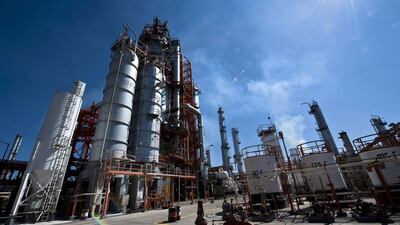Iran’s tactic of playing hardball on oil production seems to have paid off. At last week’s International Energy Forum meeting in Algiers, Khalid Al Falih, the Saudi Arabian energy minister and chairman of Saudi Aramco, made concessions and agreed that Iran, Libya and Nigeria should be given exemptions to “produce at the maximum levels that make sense’’.
There were low expectations and little hope when officials from the major oil-producing nations – Opec members, Russia and a few others – gathered at the three-day conference to discuss the possibility of an output cut after nearly two years of global oversupply. Negotiations collapsed in a similar situation in Qatar last April.
But this time, Opec, which accounts for about 40 per cent of the world’s petroleum supply, appears to have secured a deal – at the cost of the exemption given to Iran, Libya and Nigeria. Opec’s 14 nations reached an agreement on the parameters of the first oil-production cut in eight years.
Opec agreed on an outline to remove about 700,000 barrels per day (bpd) from the global market, meaning an output ceiling of between 32.5 million and 33m bpd.
At the meeting, Iran demanded its production ceiling be set at 4.2m bpd, while Saudi Arabia wanted Iran to freeze production at 3.6m bpd. This was the key stumbling block. Russia played a key role in the outcome.
Several of Opec’s members desperately needed an agreement due to their rising budget deficits. But the agreement reached is a work in progress, and will have critical limitations.
It is unlikely to comprehensively address the oil glut. Opec members produced about 33.3m bpd in August.
Secondly, the agreement has not yet set a production target for each Opec member. Some members appear to be hesitating to make any cuts, and Russia is not included in the agreement. More fundamental is the concession that Iran be allowed to increase its oil production “at maximum levels that make sense”.
The increase in oil production from Iran (alongside Nigeria and Libya) is likely to offset and neutralise the efforts of other nations’ oil-production cuts.
Iran is unlikely to stop short of producing oil at its maximum levels – 4.2m bpd – because it is not as desperate for an agreement as some of the poorer Opec members are.
Iran is emerging from four rounds of United Nations Security Council sanctions, which makes increasing oil production and sales, even at current prices, lucrative. But only about one-third of its budget is reliant on oil sales – unlike some Opec members who rely much more heavily on oil.
Iran’s economy is diversified. Having powerful export industries such as gas, transport and metals, has allowed Tehran to play hardball at Opec meetings and keep revving up oil production.
That is why the Iranian oil minister, Bijan Namdar Zanganeh, did not take the meeting in Algiers seriously. He even said that it was “not a decision-making meeting”.
According to Shana, Iran’s state media outlet, Mr Zanganeh described the gathering simply as “consultative”.
He said: “The ground is being paved for market stabilisation.”
And he repeated Iran’s long-standing position that Tehran would continue to step up its production.
On the surface and in the short-term, the Opec preliminary agreement appears to be a step forward and a reversal of previous setbacks.
Nevertheless, two main stumbling blocks remain: the very small size of the Opec production cut and Iran’s continued determination to increase production.
Dr Majid Rafizadeh is an Iranian-American political scientist, Harvard University scholar and president of the International American Council

